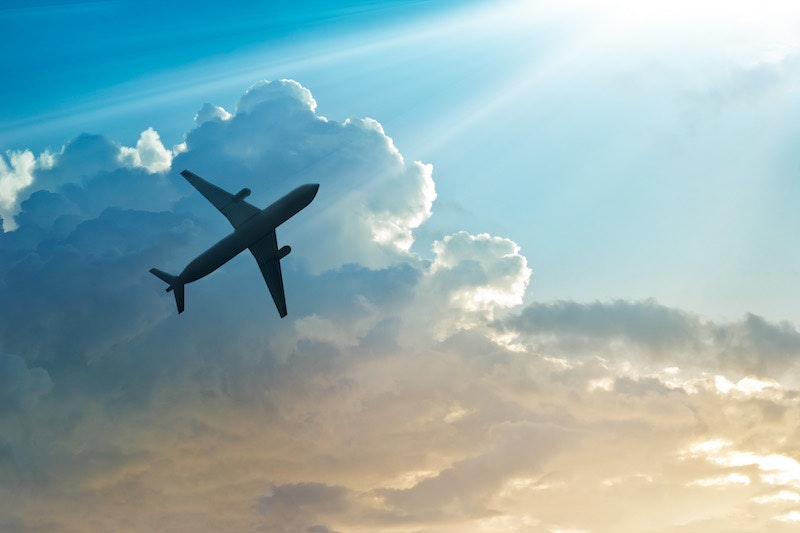Feeling frazzled? Burned out? Blah? You may want to blame those stockpiled vacation days. More than half of Americans don’t use all of their paid time off, according to the most recent survey by the US Travel Association’s Project Time Off. That amounts to 658 million unused vacation days a year. Yet science shows that getting away from the daily grind (even with a low-key staycation) is good for your health — in more ways than you may realize.
1. The Vacation Glow Starts Earlier Than You Think
Planning a getaway may conjure thoughts of juggling flights, hotels, insurance, transportation, things to do, food to eat, people to see, places to go... But guess what? No matter how chaotic travel planning may be, the sheer anticipation of a vacation ups your happiness. A 2010 study of roughly 1,500 Dutch people found that vacationers showed higher levels of overall happiness weeks — even months — before they set out on that plane, train, or automobile away from their usual routine. And another study, conducted at the University of Surrey in Guildford, England, also showed that anticipation raises “the hedonic level of the respondents” (aka happiness in vacationers) well ahead of the trip.
Level Up: Want to squeeze every bit of happiness out of your days off each year? Jeroen Nawijn, PhD, a psychology professor and researcher at the Centre for Sustainable Tourism and Transport, in Breda, Netherlands, suggests divvying your annual vacation days into several smaller trips rather than one extended holiday. Two one-week trips, for instance, create two anticipation periods that will elevate your mood, compared with only one pre-trip happiness boost if you take a two-week trip instead.
2. You Can Reset Your Stress
Science backs up what we’ve suspected all along: Going on vacation helps lower your stress levels (even if your vacation activities aren’t particularly soothing). Researchers from the University of California, San Francisco; Mount Sinai School of Medicine; and Harvard Medical School asked participants in a study to live at a resort for six days, with some of them just hanging out and others actively taking part in a meditation retreat. Their study, published in 2016, pointed to a "significant 'vacation effect' that benefited all groups." Not only did all participants anecdotally report lower stress levels, but they also exhibited gene expression changes of known stress-related genes. Or, as the study put it, "on vacation, genes that are normally needed for dealing with stress, wound healing, and injury are downregulated."
Level Up: Spread your vacation throughout the year — not just in one season (hello, summer). "Our bodies were designed to get revved up to manage a stressor and then calm down to 'rest and digest,'" says Melanie Greenberg, PhD, a clinical psychologist and author of The Stress-Proof Brain. " If you don't take breaks like vacations to relax, chronic stress and cortisol can create inflammation and impair your immunity.
3. You Could Help Safeguard Your Heart
It's true – vacations are good for both heart and soul. Studies across the years attest to how getaways keep your body's most important muscle pumping, and pumping well. Take the 1992 study that found that women who went on vacation at least twice a year had a significantly lower risk of developing a heart attack, compared with women who did so every six years or less – even after traditional risk factors like blood pressure were taken into account. Or the nine-year study of 12,000 men, published in 2000, that found those who didn't take annual vacations were 32 percent more likely to die of a heart attack and at 21 percent higher risk of death of all causes.
Level Up: If going on vacation means more time strolling and less time sitting at a desk, well, you may be giving your heart a double health boost. Research suggests that too much time warming a chair could contribute to heart disease.
4. You Can Put the Sheep-Counting on Pause
Lazy vacations are the best — not only do you get to repay your sleep debt, you'll be able to properly recharge and improve your sleeping habits post-trip. So says a 2006 study commissioned by Air New Zealand and conducted by the scientific consulting firm Alertness Solutions, which has worked with NASA pilots and astronauts on sleep issues. Researchers asked 15 people flying from the United States to New Zealand for vacations lasting from 7 to 12 days to wear wrist devices that monitored both the quantity and quality of their sleep before, during and after their trips. They found that it took only two to three days on vacation for people to start getting an hour more of good quality sleep each night, and to see an 80 percent improvement in their reaction times. And when they got home, they continued to sleep an extra hour each night.
Level Up: Have a hard time getting shut-eye when far from home? “Consider packing a white noise machine to muffle noises in the new environment,” says W. Christopher Winter, MD, founder of Charlottesville Neurology and Sleep Medicine and author of The Sleep Solution.
5. You Might Discover a New Side to Yourself
Long sojourns can help you appreciate a new culture or language, sure, but they may also help teach you something about yourself. A 2013 study of German college students, some of whom studied abroad for one or two semesters and some of whom stayed put, found that those who traveled came back with increases in three of five personality dimensions — openness to experience, agreeableness (or the need to get along with others), and emotional stability (also known as, um, neuroticism). Although these increases weren't necessarily huge, they were reliable regardless of the amount of time spent abroad. The main factor in these personality changes? The international relationships forged abroad, according to the study. "Successful handling of multicultural social encounters," as the study charmingly puts it, is not easy, but it can help a traveler cope with the initial stress of acculturating to a new place, and reduce stress and anxiety – specifically leading to a drop in neuroticism.
Level Up: Your instinct may be to keep your nose nervously buried in that guide book, but go ahead and make small talk with the locals.
6. You Can Revel in the Greenery
The United Nations estimates that 54.5 percent of the world's population lives in urban settlements, and that that number might grow to 60 percent by 2030. More people than ever are leading city lives, as a 2008 study shows; a bustling city is a hard backdrop for your brain to take a break. On the other hand, the stimuli in natural environments – think birdsong, toads croaking, a gurgling brook – make modest bids for your attention, "allowing top-down, directed attention abilities a chance to replenish," the authors noted. Soaking up some natural sights could lower your blood pressure and the cortisol levels (aka the stress hormone), as Japanese scientists found. And time in nature may even give you a psych lift: In 2015, Stanford University researchers found that spending time outdoors helps people out of brooding mental ruts, which have been associated with heightened risk of depression and other mental illnesses.
Level Up: Not all nature is created equal, so don’t worry about clocking a week in the woods if that sounds like misery. “I might like forests and feel agoraphobic at the ocean, and you might love the ocean and hate the woods," says Florence Williams, author of The Nature Fix: Why Nature Makes Us Happier, Healthier and More Creative. “Pay attention to how you feel and seek out the happy nature neurons that work for you.”






